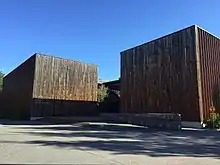European Forest Institute
The European Forest Institute (EFI) is an international organization established by the European states. It has 29 Member Countries, and c. 120 member organizations from 38 different countries working in diverse research fields. EFI provides forest-related knowledge around three interconnected and interdisciplinary themes: bioeconomy, resilience and governance.
 | |
| Formation | 1993 as a NGO and 2005 as an international organization [1] |
|---|---|
| Headquarters | Joensuu, Finland |
Membership | 29 member states |
EFI Director | Marc Palahí |
| Website | efi.int |
Organization

Places and staff
EFI' s headquarters is located in Joensuu, Finland, and also has offices in Barcelona, Bonn and Brussels as well as project offices in Malaysia and China. It employs a staff of over 100 experts.
Country members
The Convention on the European Forest Institute has been ratified by total of 29 European countries[2] by the summer of 2018, namely Austria, Belgium, Bulgaria, Croatia, Czech Republic, Denmark, Estonia, Finland, France, Germany, Greece, Ireland, Italy, Latvia, Lithuania, Luxembourg, Netherlands, Norway, Poland, Portugal, Romania, Serbia, Slovak Republic, Slovenia, Spain, Sweden, Switzerland, Turkey and the United Kingdom. These countries each have a seat in the highest decision-making body in EFI's organisation, the council.
Associate and Affiliate members
EFI currently has approximately 120 member organisations from more than 38 countries. The benefits of associate and affiliate membership include voting rights for important decisions, access to the EFI network, news and announcements related to European forest research, visibility on the EFI website, and opportunity to receive EFI publications and publish announcements in EFI Network News free of charge.
Activities
EFI conducts research and provides policy support on forest related issues. Further, it facilitate and stimulates forest related networking as well as promotes the supply of unbiased and policy relevant information on forests and forestry. It also advocates for forest research and for scientifically sound information as a basis for policy-making on forests.
EFI excels in carrying out projects at the European level, and has a track record of over 30 projects carried out for the European Commission DGs during the past few years. EFI puts increasing emphasis on cross-sectoral approaches in its research and development activities. It is thus in a good position to have efficient access to social, economic and environmental expertise covering all of Europe's bio-geographical regions. The work in the field of policy support includes enhanced support for decision takers and policy makers. For example, the high-level forum on forests, ThinkForest, brings together high-level policy makers and leading European forest scientists to generate science-policy dialogue on strategic forest-related issues. EFI is quickly becoming a leading science-policy platform providing forest-related knowledge to build a sustainable future: connecting knowledge to action.
EFI has a strong policy support role by hosting the EU FLEGT Facility [3] which supports the EU Forest Law Enforcement, Governance and Trade (FLEGT) process in developing countries, related to the implementation of the EU FLEGT Action Plan. EU FLEGT Facility assist the European Commission and the EU Member States in their joint efforts of its implementation.
External links
References
- EFI started its activities in 1993 as an independent, international and non-governmental institution (Association). In 2005 EFI received the legal status of international organization. The Convention on the European Forest Institute and Host country agreement are available on the website of the Finnish Ministry of Foreign Affairs
- List of EFI Country members
- EU FLEGT Facility